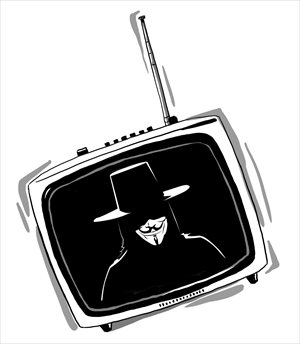Mask of V not hiding instrument of social change

"Censors and systems of surveillance coercing your conformity and soliciting your submission." Those were the words heard by anybody watching CCTV-6, the State broadcaster's movie channel, on the night of December 14. To widespread consternation and amusement, V for Vendetta, a film depicting a lone vigilante's struggle against a fascist dictatorship was broadcast uncut across China.
We can imagine the squeaks of excitement from Beijing intelligentsia and the mild confusion from many people curled up on the sofa for an evening's entertainment.
Predictably, battle lines were soon drawn up between those seeing this as a clear sign of reform and an easing-up of censorship and those who know of how incredibly inconsistent Chinese media regulation has been down the years.
Since the movieV for Vendetta came out back in 2005, inspired by the excellent Alan Moore graphic novel of the same name, its protagonist's Guy Fawkes mask has become a symbol used by Anonymous hackers, Occupy Wall Street protesters, and Polish members of parliament worried about an anti-counterfeiting bill.
Now, it seems this symbol has made its way to Chinese shores. Weibo is already awash with references to or pictures of the vigilante V and his mask, and Carrefour shops in Shanghai have already got the mask in stock. But yet again, it seems conclusions are being drawn too hastily about a fairly innocuous event.
For all the effect the Great Firewall and the country's web of censorship cause, the tone of public debate has greatly evolved here in the last few years. All manner of foreign movies are easily accessed at DVD stores or online almost everywhere in China. The real-name policy on Weibo has not curbed the routine lambasting of government actions.
One of the principal architects against this change has been the State Administration of Radio, Film and Television (SARFT). It is SARFT who routinely decides to declare war on entire entertainment genres, whether it be soap operas featuring time travel or too frequent reality shows.
That's why the decision to air V for Vendetta took so many people off-guard. It seems at odds with SARFT's past as one of the bastions of State censorship and media oversight in China.
However, this is only true if we view the entire Chinese government as a single, living, united consciousness. I am not familiar with SARFT's decision-making process on what to allow on the air, but I am certain the same few group of people do not solely approve every single program appearing on every CCTV channel.
The green light for this film may have been given by a single rebellious executive, by a senior official who didn't know what the movie was about or by a review panel who decided to risk it. Ultimately, it doesn't really matter.
V for Vendetta being aired on Chinese television is a breath of fresh air which will hopefully not be an isolated event. However, it really reflects an increasingly pluralized and diverse Chinese society, ranging from discussions on Weibo to the Party's internal decision-making.
This country is taking an inexorable path, as more of its people travel and are educated abroad, interact online, and investigate foreign cultures.
Whether the government approves or not, it can either let the public educate themselves and face the consequences or decide to loosen censorship rules and hope to retain a measure of legitimacy.
The author is an editor with the Global Times. chrisdalby@globaltimes.com.cn